Hospitality Consumer Behaviour and Insight: Factors, Trends, and Decision-Making Process
VerifiedAdded on 2023/06/04
|14
|4234
|299
AI Summary
This report discusses the factors that influence consumer behaviour and attitudes in the hospitality industry, including cultural, social, personal, and psychological factors. It also explores the impact of digital technology on consumer trends and the phases of the decision-making process. The report evaluates the different approaches to market research and methods used to understand consumer behaviour. Course code and college/university not mentioned.
Contribute Materials
Your contribution can guide someone’s learning journey. Share your
documents today.
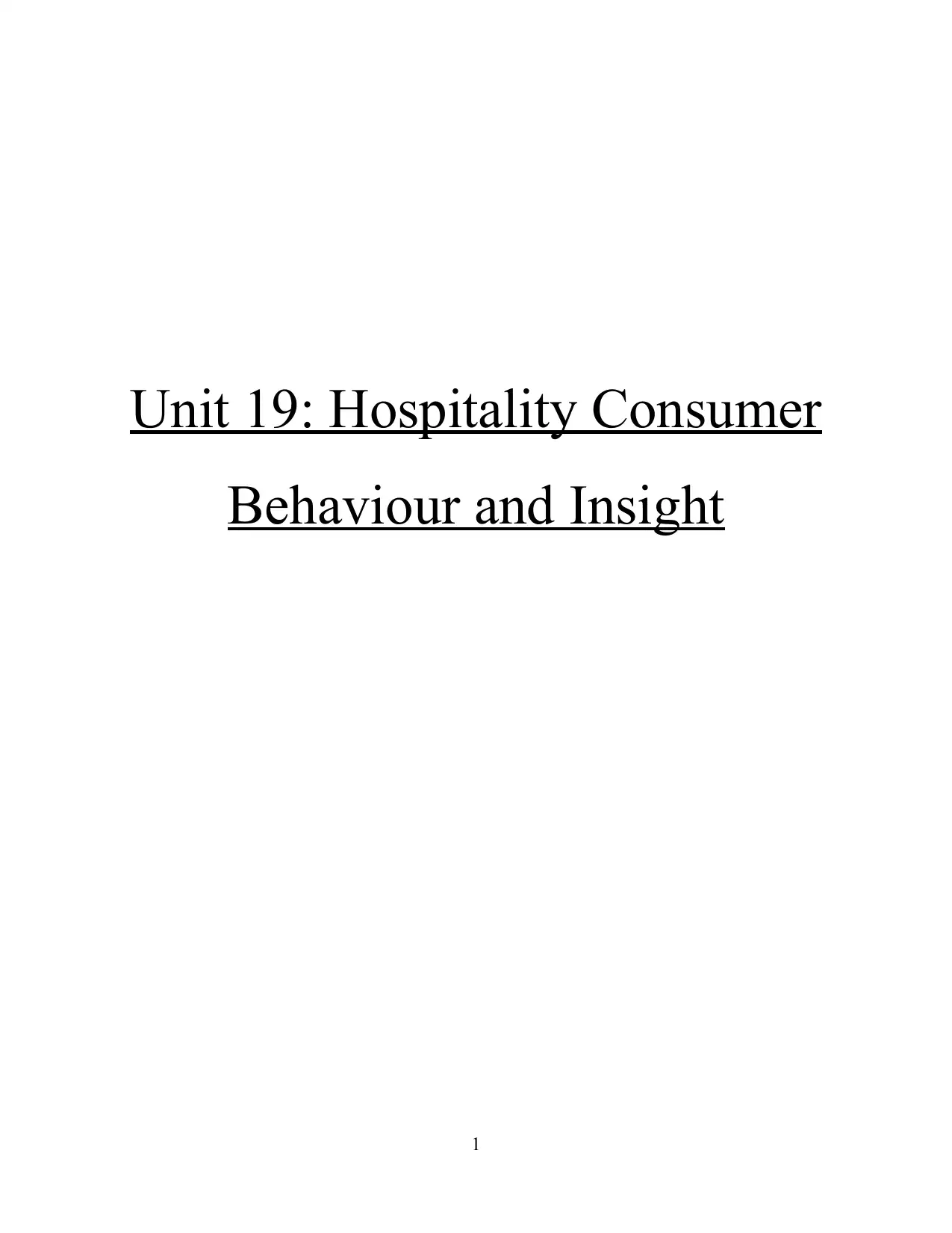
Unit 19: Hospitality Consumer
Behaviour and Insight
1
Behaviour and Insight
1
Secure Best Marks with AI Grader
Need help grading? Try our AI Grader for instant feedback on your assignments.
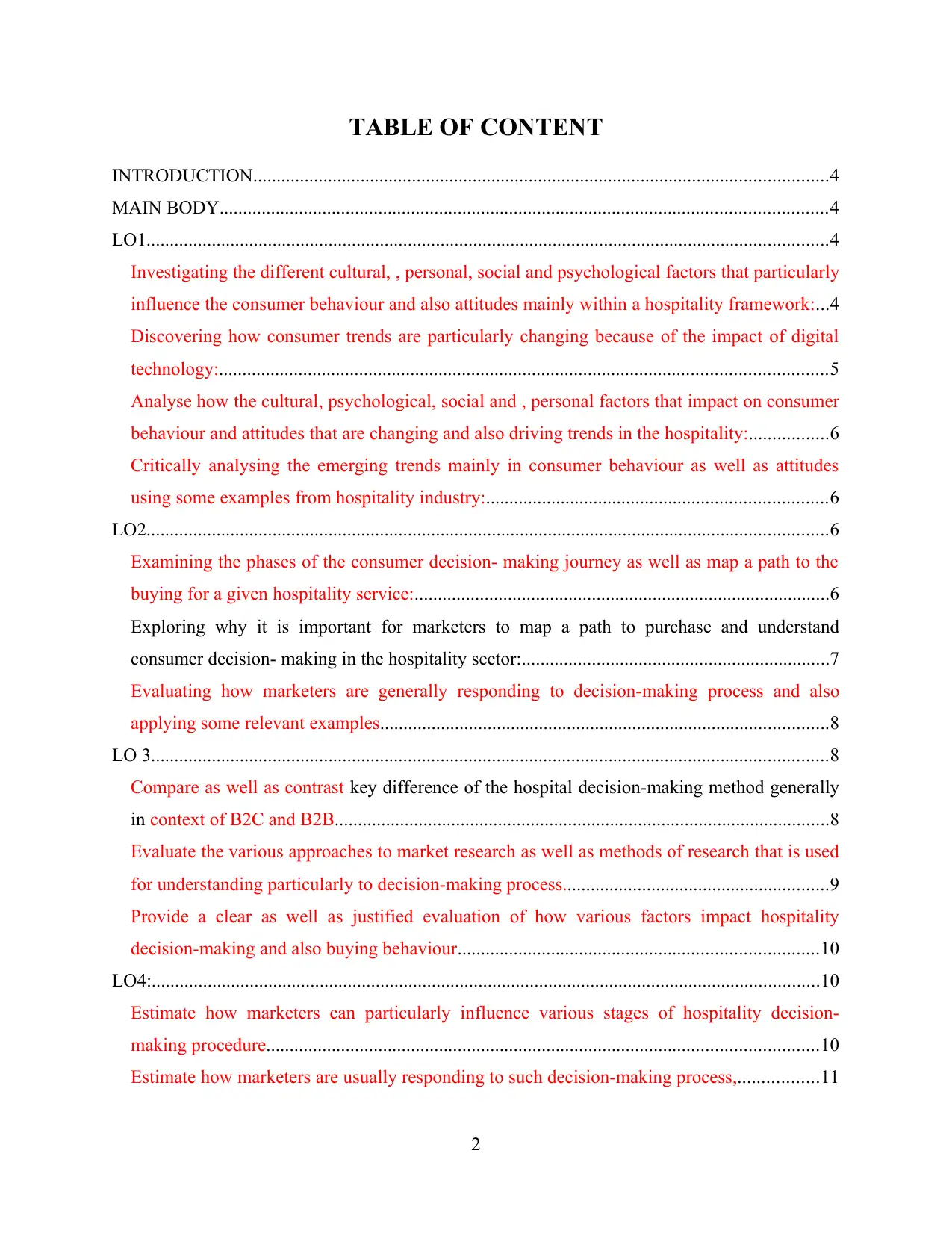
TABLE OF CONTENT
INTRODUCTION...........................................................................................................................4
MAIN BODY..................................................................................................................................4
LO1..................................................................................................................................................4
Investigating the different cultural, , personal, social and psychological factors that particularly
influence the consumer behaviour and also attitudes mainly within a hospitality framework:...4
Discovering how consumer trends are particularly changing because of the impact of digital
technology:..................................................................................................................................5
Analyse how the cultural, psychological, social and , personal factors that impact on consumer
behaviour and attitudes that are changing and also driving trends in the hospitality:.................6
Critically analysing the emerging trends mainly in consumer behaviour as well as attitudes
using some examples from hospitality industry:.........................................................................6
LO2..................................................................................................................................................6
Examining the phases of the consumer decision- making journey as well as map a path to the
buying for a given hospitality service:.........................................................................................6
Exploring why it is important for marketers to map a path to purchase and understand
consumer decision- making in the hospitality sector:..................................................................7
Evaluating how marketers are generally responding to decision-making process and also
applying some relevant examples................................................................................................8
LO 3.................................................................................................................................................8
Compare as well as contrast key difference of the hospital decision-making method generally
in context of B2C and B2B..........................................................................................................8
Evaluate the various approaches to market research as well as methods of research that is used
for understanding particularly to decision-making process.........................................................9
Provide a clear as well as justified evaluation of how various factors impact hospitality
decision-making and also buying behaviour.............................................................................10
LO4:...............................................................................................................................................10
Estimate how marketers can particularly influence various stages of hospitality decision-
making procedure......................................................................................................................10
Estimate how marketers are usually responding to such decision-making process,.................11
2
INTRODUCTION...........................................................................................................................4
MAIN BODY..................................................................................................................................4
LO1..................................................................................................................................................4
Investigating the different cultural, , personal, social and psychological factors that particularly
influence the consumer behaviour and also attitudes mainly within a hospitality framework:...4
Discovering how consumer trends are particularly changing because of the impact of digital
technology:..................................................................................................................................5
Analyse how the cultural, psychological, social and , personal factors that impact on consumer
behaviour and attitudes that are changing and also driving trends in the hospitality:.................6
Critically analysing the emerging trends mainly in consumer behaviour as well as attitudes
using some examples from hospitality industry:.........................................................................6
LO2..................................................................................................................................................6
Examining the phases of the consumer decision- making journey as well as map a path to the
buying for a given hospitality service:.........................................................................................6
Exploring why it is important for marketers to map a path to purchase and understand
consumer decision- making in the hospitality sector:..................................................................7
Evaluating how marketers are generally responding to decision-making process and also
applying some relevant examples................................................................................................8
LO 3.................................................................................................................................................8
Compare as well as contrast key difference of the hospital decision-making method generally
in context of B2C and B2B..........................................................................................................8
Evaluate the various approaches to market research as well as methods of research that is used
for understanding particularly to decision-making process.........................................................9
Provide a clear as well as justified evaluation of how various factors impact hospitality
decision-making and also buying behaviour.............................................................................10
LO4:...............................................................................................................................................10
Estimate how marketers can particularly influence various stages of hospitality decision-
making procedure......................................................................................................................10
Estimate how marketers are usually responding to such decision-making process,.................11
2
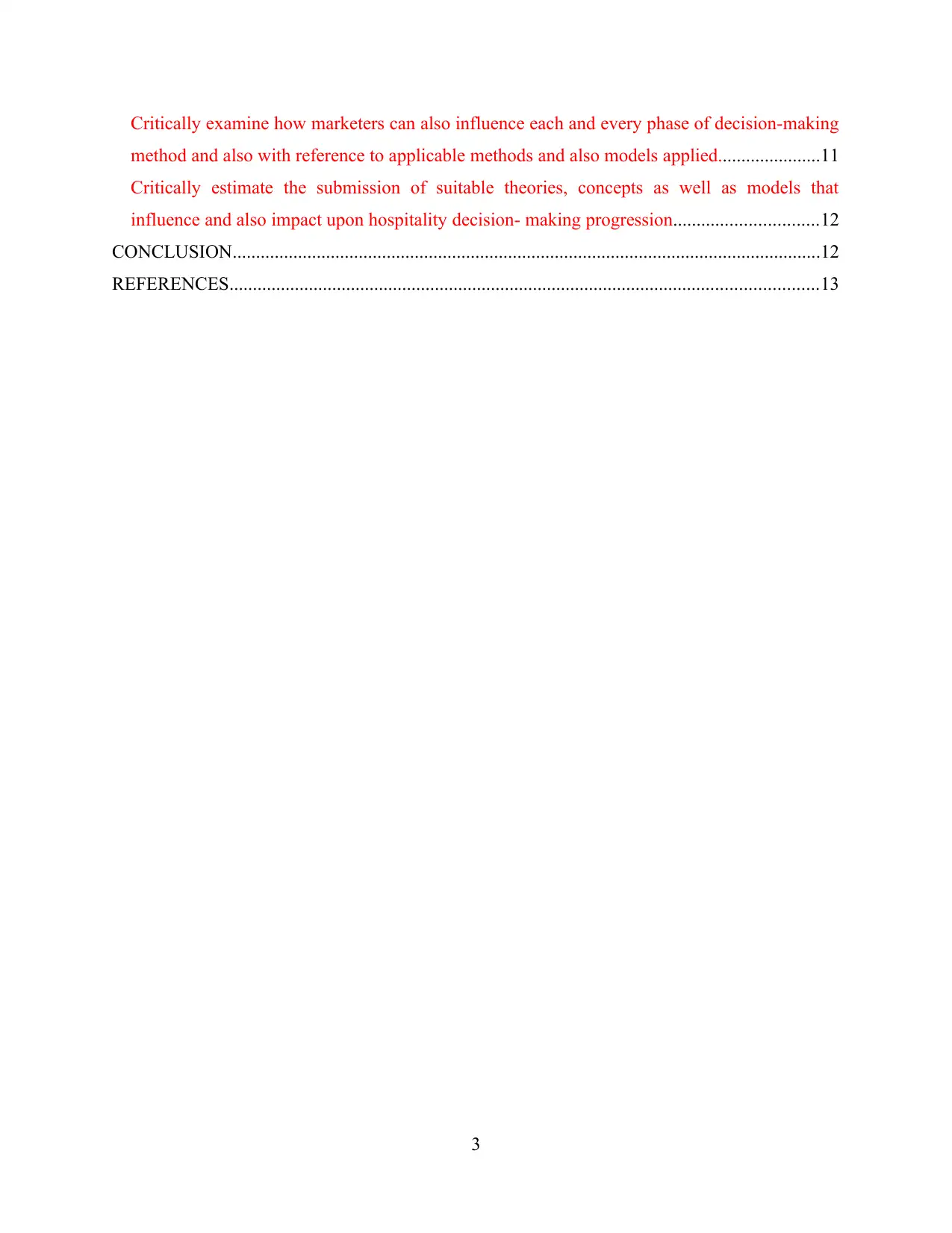
Critically examine how marketers can also influence each and every phase of decision-making
method and also with reference to applicable methods and also models applied......................11
Critically estimate the submission of suitable theories, concepts as well as models that
influence and also impact upon hospitality decision- making progression...............................12
CONCLUSION..............................................................................................................................12
REFERENCES..............................................................................................................................13
3
method and also with reference to applicable methods and also models applied......................11
Critically estimate the submission of suitable theories, concepts as well as models that
influence and also impact upon hospitality decision- making progression...............................12
CONCLUSION..............................................................................................................................12
REFERENCES..............................................................................................................................13
3
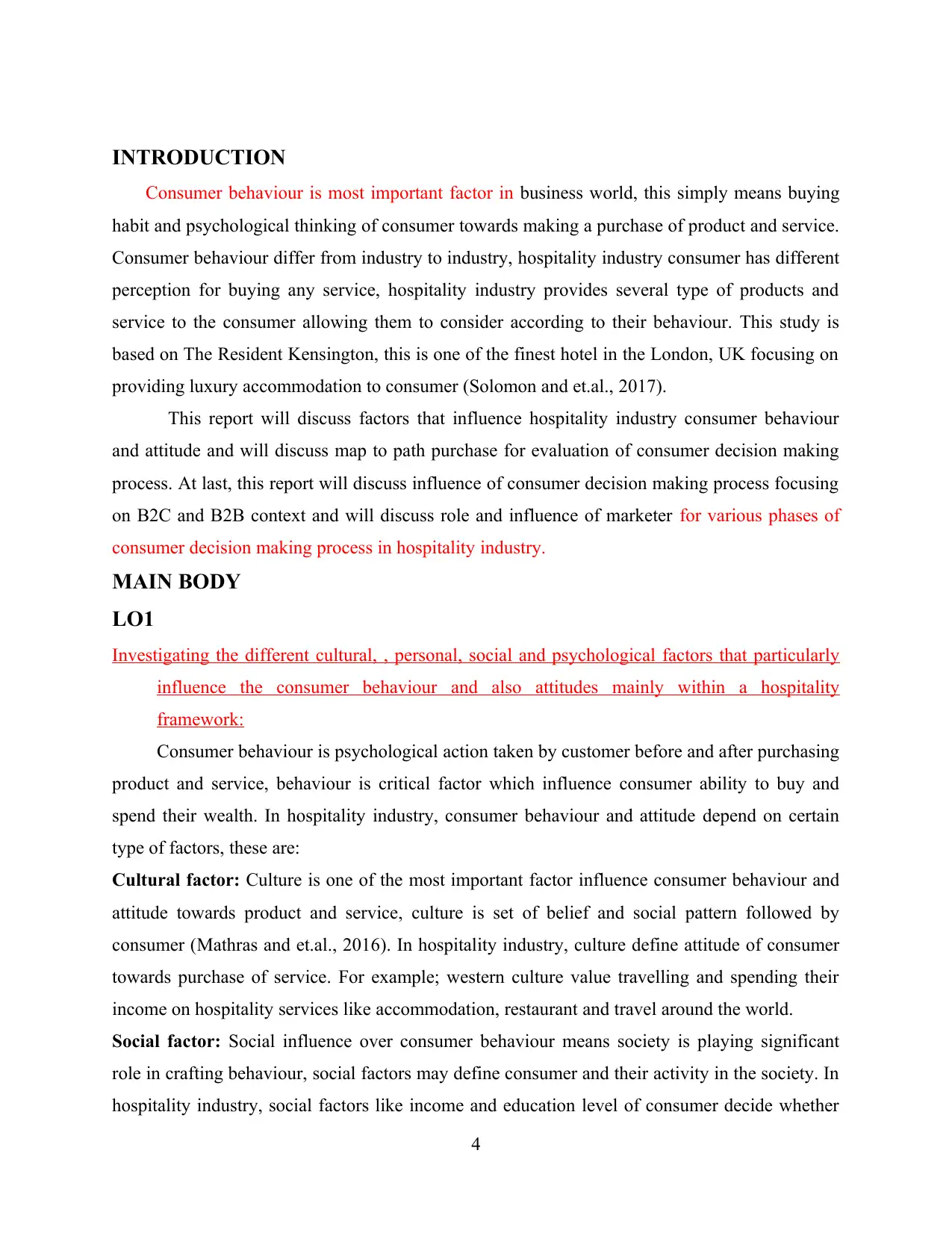
INTRODUCTION
Consumer behaviour is most important factor in business world, this simply means buying
habit and psychological thinking of consumer towards making a purchase of product and service.
Consumer behaviour differ from industry to industry, hospitality industry consumer has different
perception for buying any service, hospitality industry provides several type of products and
service to the consumer allowing them to consider according to their behaviour. This study is
based on The Resident Kensington, this is one of the finest hotel in the London, UK focusing on
providing luxury accommodation to consumer (Solomon and et.al., 2017).
This report will discuss factors that influence hospitality industry consumer behaviour
and attitude and will discuss map to path purchase for evaluation of consumer decision making
process. At last, this report will discuss influence of consumer decision making process focusing
on B2C and B2B context and will discuss role and influence of marketer for various phases of
consumer decision making process in hospitality industry.
MAIN BODY
LO1
Investigating the different cultural, , personal, social and psychological factors that particularly
influence the consumer behaviour and also attitudes mainly within a hospitality
framework:
Consumer behaviour is psychological action taken by customer before and after purchasing
product and service, behaviour is critical factor which influence consumer ability to buy and
spend their wealth. In hospitality industry, consumer behaviour and attitude depend on certain
type of factors, these are:
Cultural factor: Culture is one of the most important factor influence consumer behaviour and
attitude towards product and service, culture is set of belief and social pattern followed by
consumer (Mathras and et.al., 2016). In hospitality industry, culture define attitude of consumer
towards purchase of service. For example; western culture value travelling and spending their
income on hospitality services like accommodation, restaurant and travel around the world.
Social factor: Social influence over consumer behaviour means society is playing significant
role in crafting behaviour, social factors may define consumer and their activity in the society. In
hospitality industry, social factors like income and education level of consumer decide whether
4
Consumer behaviour is most important factor in business world, this simply means buying
habit and psychological thinking of consumer towards making a purchase of product and service.
Consumer behaviour differ from industry to industry, hospitality industry consumer has different
perception for buying any service, hospitality industry provides several type of products and
service to the consumer allowing them to consider according to their behaviour. This study is
based on The Resident Kensington, this is one of the finest hotel in the London, UK focusing on
providing luxury accommodation to consumer (Solomon and et.al., 2017).
This report will discuss factors that influence hospitality industry consumer behaviour
and attitude and will discuss map to path purchase for evaluation of consumer decision making
process. At last, this report will discuss influence of consumer decision making process focusing
on B2C and B2B context and will discuss role and influence of marketer for various phases of
consumer decision making process in hospitality industry.
MAIN BODY
LO1
Investigating the different cultural, , personal, social and psychological factors that particularly
influence the consumer behaviour and also attitudes mainly within a hospitality
framework:
Consumer behaviour is psychological action taken by customer before and after purchasing
product and service, behaviour is critical factor which influence consumer ability to buy and
spend their wealth. In hospitality industry, consumer behaviour and attitude depend on certain
type of factors, these are:
Cultural factor: Culture is one of the most important factor influence consumer behaviour and
attitude towards product and service, culture is set of belief and social pattern followed by
consumer (Mathras and et.al., 2016). In hospitality industry, culture define attitude of consumer
towards purchase of service. For example; western culture value travelling and spending their
income on hospitality services like accommodation, restaurant and travel around the world.
Social factor: Social influence over consumer behaviour means society is playing significant
role in crafting behaviour, social factors may define consumer and their activity in the society. In
hospitality industry, social factors like income and education level of consumer decide whether
4
Secure Best Marks with AI Grader
Need help grading? Try our AI Grader for instant feedback on your assignments.
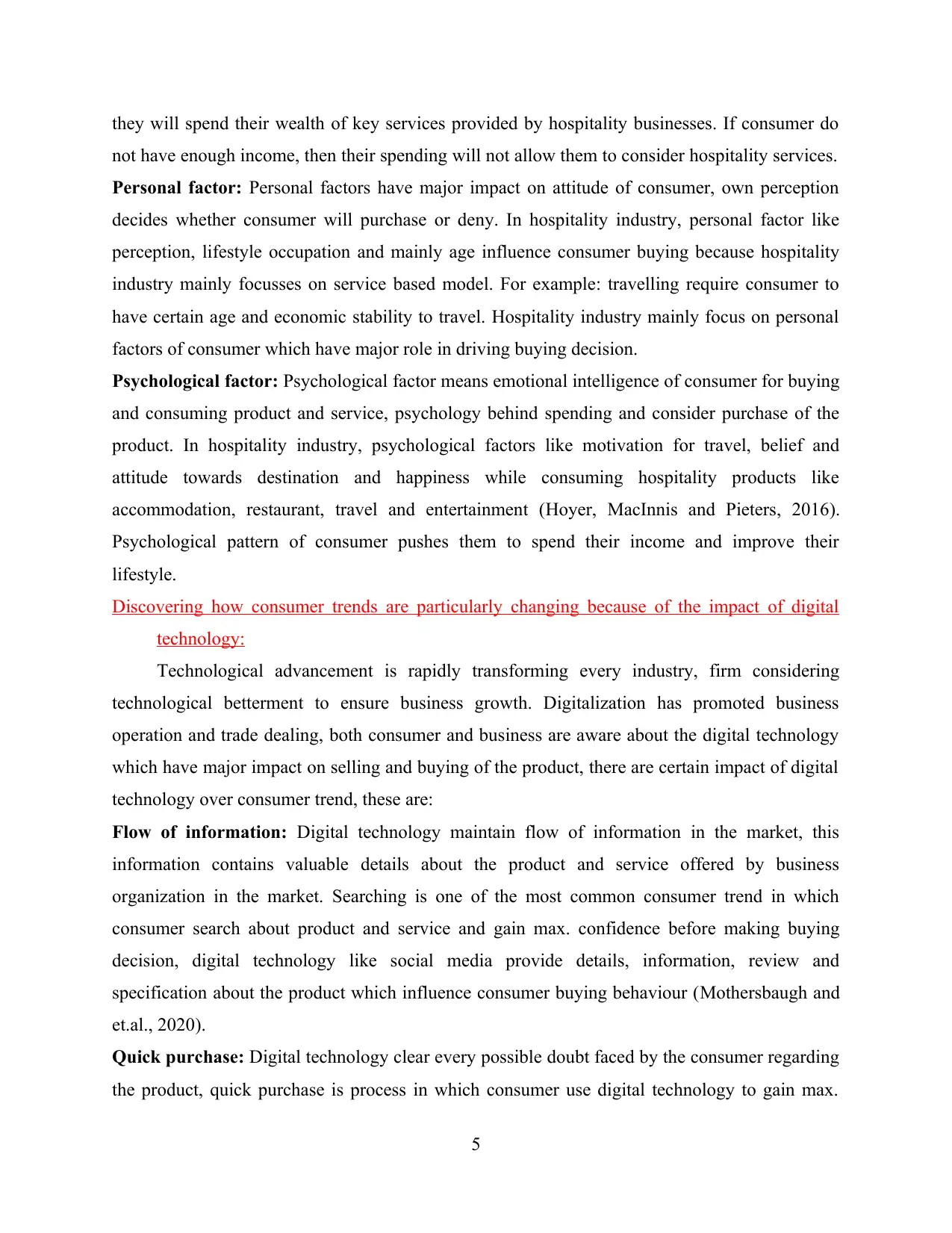
they will spend their wealth of key services provided by hospitality businesses. If consumer do
not have enough income, then their spending will not allow them to consider hospitality services.
Personal factor: Personal factors have major impact on attitude of consumer, own perception
decides whether consumer will purchase or deny. In hospitality industry, personal factor like
perception, lifestyle occupation and mainly age influence consumer buying because hospitality
industry mainly focusses on service based model. For example: travelling require consumer to
have certain age and economic stability to travel. Hospitality industry mainly focus on personal
factors of consumer which have major role in driving buying decision.
Psychological factor: Psychological factor means emotional intelligence of consumer for buying
and consuming product and service, psychology behind spending and consider purchase of the
product. In hospitality industry, psychological factors like motivation for travel, belief and
attitude towards destination and happiness while consuming hospitality products like
accommodation, restaurant, travel and entertainment (Hoyer, MacInnis and Pieters, 2016).
Psychological pattern of consumer pushes them to spend their income and improve their
lifestyle.
Discovering how consumer trends are particularly changing because of the impact of digital
technology:
Technological advancement is rapidly transforming every industry, firm considering
technological betterment to ensure business growth. Digitalization has promoted business
operation and trade dealing, both consumer and business are aware about the digital technology
which have major impact on selling and buying of the product, there are certain impact of digital
technology over consumer trend, these are:
Flow of information: Digital technology maintain flow of information in the market, this
information contains valuable details about the product and service offered by business
organization in the market. Searching is one of the most common consumer trend in which
consumer search about product and service and gain max. confidence before making buying
decision, digital technology like social media provide details, information, review and
specification about the product which influence consumer buying behaviour (Mothersbaugh and
et.al., 2020).
Quick purchase: Digital technology clear every possible doubt faced by the consumer regarding
the product, quick purchase is process in which consumer use digital technology to gain max.
5
not have enough income, then their spending will not allow them to consider hospitality services.
Personal factor: Personal factors have major impact on attitude of consumer, own perception
decides whether consumer will purchase or deny. In hospitality industry, personal factor like
perception, lifestyle occupation and mainly age influence consumer buying because hospitality
industry mainly focusses on service based model. For example: travelling require consumer to
have certain age and economic stability to travel. Hospitality industry mainly focus on personal
factors of consumer which have major role in driving buying decision.
Psychological factor: Psychological factor means emotional intelligence of consumer for buying
and consuming product and service, psychology behind spending and consider purchase of the
product. In hospitality industry, psychological factors like motivation for travel, belief and
attitude towards destination and happiness while consuming hospitality products like
accommodation, restaurant, travel and entertainment (Hoyer, MacInnis and Pieters, 2016).
Psychological pattern of consumer pushes them to spend their income and improve their
lifestyle.
Discovering how consumer trends are particularly changing because of the impact of digital
technology:
Technological advancement is rapidly transforming every industry, firm considering
technological betterment to ensure business growth. Digitalization has promoted business
operation and trade dealing, both consumer and business are aware about the digital technology
which have major impact on selling and buying of the product, there are certain impact of digital
technology over consumer trend, these are:
Flow of information: Digital technology maintain flow of information in the market, this
information contains valuable details about the product and service offered by business
organization in the market. Searching is one of the most common consumer trend in which
consumer search about product and service and gain max. confidence before making buying
decision, digital technology like social media provide details, information, review and
specification about the product which influence consumer buying behaviour (Mothersbaugh and
et.al., 2020).
Quick purchase: Digital technology clear every possible doubt faced by the consumer regarding
the product, quick purchase is process in which consumer use digital technology to gain max.
5
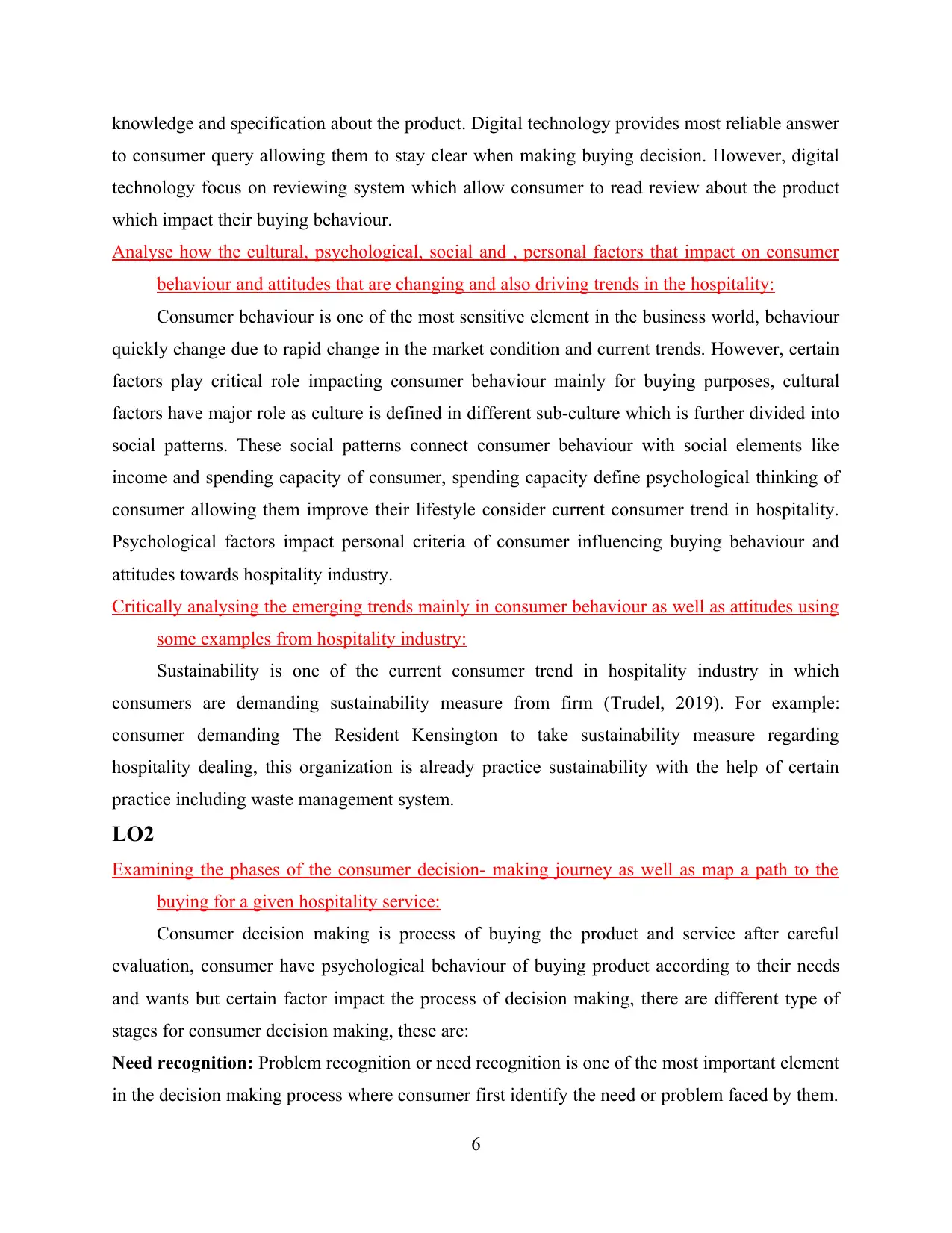
knowledge and specification about the product. Digital technology provides most reliable answer
to consumer query allowing them to stay clear when making buying decision. However, digital
technology focus on reviewing system which allow consumer to read review about the product
which impact their buying behaviour.
Analyse how the cultural, psychological, social and , personal factors that impact on consumer
behaviour and attitudes that are changing and also driving trends in the hospitality:
Consumer behaviour is one of the most sensitive element in the business world, behaviour
quickly change due to rapid change in the market condition and current trends. However, certain
factors play critical role impacting consumer behaviour mainly for buying purposes, cultural
factors have major role as culture is defined in different sub-culture which is further divided into
social patterns. These social patterns connect consumer behaviour with social elements like
income and spending capacity of consumer, spending capacity define psychological thinking of
consumer allowing them improve their lifestyle consider current consumer trend in hospitality.
Psychological factors impact personal criteria of consumer influencing buying behaviour and
attitudes towards hospitality industry.
Critically analysing the emerging trends mainly in consumer behaviour as well as attitudes using
some examples from hospitality industry:
Sustainability is one of the current consumer trend in hospitality industry in which
consumers are demanding sustainability measure from firm (Trudel, 2019). For example:
consumer demanding The Resident Kensington to take sustainability measure regarding
hospitality dealing, this organization is already practice sustainability with the help of certain
practice including waste management system.
LO2
Examining the phases of the consumer decision- making journey as well as map a path to the
buying for a given hospitality service:
Consumer decision making is process of buying the product and service after careful
evaluation, consumer have psychological behaviour of buying product according to their needs
and wants but certain factor impact the process of decision making, there are different type of
stages for consumer decision making, these are:
Need recognition: Problem recognition or need recognition is one of the most important element
in the decision making process where consumer first identify the need or problem faced by them.
6
to consumer query allowing them to stay clear when making buying decision. However, digital
technology focus on reviewing system which allow consumer to read review about the product
which impact their buying behaviour.
Analyse how the cultural, psychological, social and , personal factors that impact on consumer
behaviour and attitudes that are changing and also driving trends in the hospitality:
Consumer behaviour is one of the most sensitive element in the business world, behaviour
quickly change due to rapid change in the market condition and current trends. However, certain
factors play critical role impacting consumer behaviour mainly for buying purposes, cultural
factors have major role as culture is defined in different sub-culture which is further divided into
social patterns. These social patterns connect consumer behaviour with social elements like
income and spending capacity of consumer, spending capacity define psychological thinking of
consumer allowing them improve their lifestyle consider current consumer trend in hospitality.
Psychological factors impact personal criteria of consumer influencing buying behaviour and
attitudes towards hospitality industry.
Critically analysing the emerging trends mainly in consumer behaviour as well as attitudes using
some examples from hospitality industry:
Sustainability is one of the current consumer trend in hospitality industry in which
consumers are demanding sustainability measure from firm (Trudel, 2019). For example:
consumer demanding The Resident Kensington to take sustainability measure regarding
hospitality dealing, this organization is already practice sustainability with the help of certain
practice including waste management system.
LO2
Examining the phases of the consumer decision- making journey as well as map a path to the
buying for a given hospitality service:
Consumer decision making is process of buying the product and service after careful
evaluation, consumer have psychological behaviour of buying product according to their needs
and wants but certain factor impact the process of decision making, there are different type of
stages for consumer decision making, these are:
Need recognition: Problem recognition or need recognition is one of the most important element
in the decision making process where consumer first identify the need or problem faced by them.
6
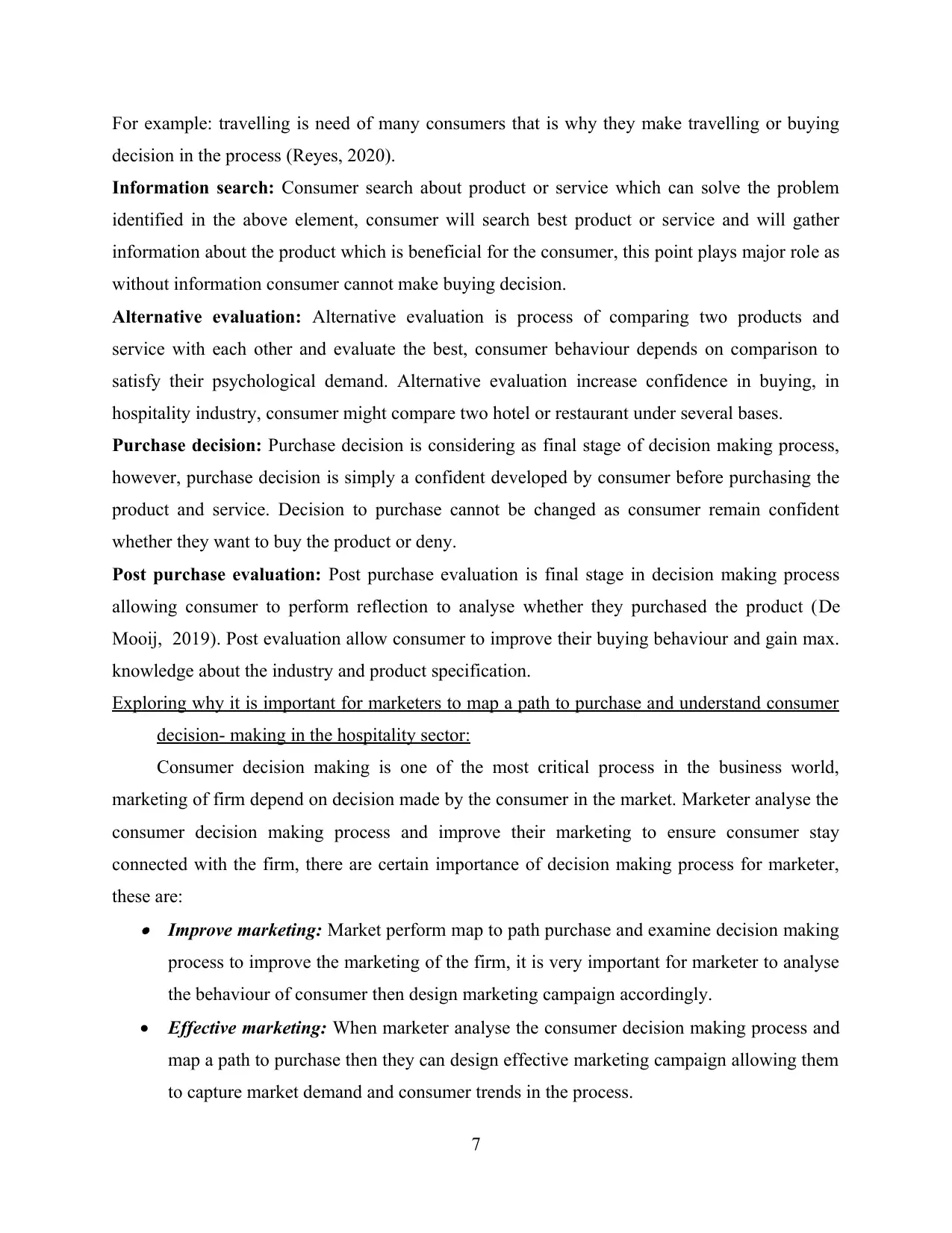
For example: travelling is need of many consumers that is why they make travelling or buying
decision in the process (Reyes, 2020).
Information search: Consumer search about product or service which can solve the problem
identified in the above element, consumer will search best product or service and will gather
information about the product which is beneficial for the consumer, this point plays major role as
without information consumer cannot make buying decision.
Alternative evaluation: Alternative evaluation is process of comparing two products and
service with each other and evaluate the best, consumer behaviour depends on comparison to
satisfy their psychological demand. Alternative evaluation increase confidence in buying, in
hospitality industry, consumer might compare two hotel or restaurant under several bases.
Purchase decision: Purchase decision is considering as final stage of decision making process,
however, purchase decision is simply a confident developed by consumer before purchasing the
product and service. Decision to purchase cannot be changed as consumer remain confident
whether they want to buy the product or deny.
Post purchase evaluation: Post purchase evaluation is final stage in decision making process
allowing consumer to perform reflection to analyse whether they purchased the product (De
Mooij, 2019). Post evaluation allow consumer to improve their buying behaviour and gain max.
knowledge about the industry and product specification.
Exploring why it is important for marketers to map a path to purchase and understand consumer
decision- making in the hospitality sector:
Consumer decision making is one of the most critical process in the business world,
marketing of firm depend on decision made by the consumer in the market. Marketer analyse the
consumer decision making process and improve their marketing to ensure consumer stay
connected with the firm, there are certain importance of decision making process for marketer,
these are: Improve marketing: Market perform map to path purchase and examine decision making
process to improve the marketing of the firm, it is very important for marketer to analyse
the behaviour of consumer then design marketing campaign accordingly.
Effective marketing: When marketer analyse the consumer decision making process and
map a path to purchase then they can design effective marketing campaign allowing them
to capture market demand and consumer trends in the process.
7
decision in the process (Reyes, 2020).
Information search: Consumer search about product or service which can solve the problem
identified in the above element, consumer will search best product or service and will gather
information about the product which is beneficial for the consumer, this point plays major role as
without information consumer cannot make buying decision.
Alternative evaluation: Alternative evaluation is process of comparing two products and
service with each other and evaluate the best, consumer behaviour depends on comparison to
satisfy their psychological demand. Alternative evaluation increase confidence in buying, in
hospitality industry, consumer might compare two hotel or restaurant under several bases.
Purchase decision: Purchase decision is considering as final stage of decision making process,
however, purchase decision is simply a confident developed by consumer before purchasing the
product and service. Decision to purchase cannot be changed as consumer remain confident
whether they want to buy the product or deny.
Post purchase evaluation: Post purchase evaluation is final stage in decision making process
allowing consumer to perform reflection to analyse whether they purchased the product (De
Mooij, 2019). Post evaluation allow consumer to improve their buying behaviour and gain max.
knowledge about the industry and product specification.
Exploring why it is important for marketers to map a path to purchase and understand consumer
decision- making in the hospitality sector:
Consumer decision making is one of the most critical process in the business world,
marketing of firm depend on decision made by the consumer in the market. Marketer analyse the
consumer decision making process and improve their marketing to ensure consumer stay
connected with the firm, there are certain importance of decision making process for marketer,
these are: Improve marketing: Market perform map to path purchase and examine decision making
process to improve the marketing of the firm, it is very important for marketer to analyse
the behaviour of consumer then design marketing campaign accordingly.
Effective marketing: When marketer analyse the consumer decision making process and
map a path to purchase then they can design effective marketing campaign allowing them
to capture market demand and consumer trends in the process.
7
Paraphrase This Document
Need a fresh take? Get an instant paraphrase of this document with our AI Paraphraser
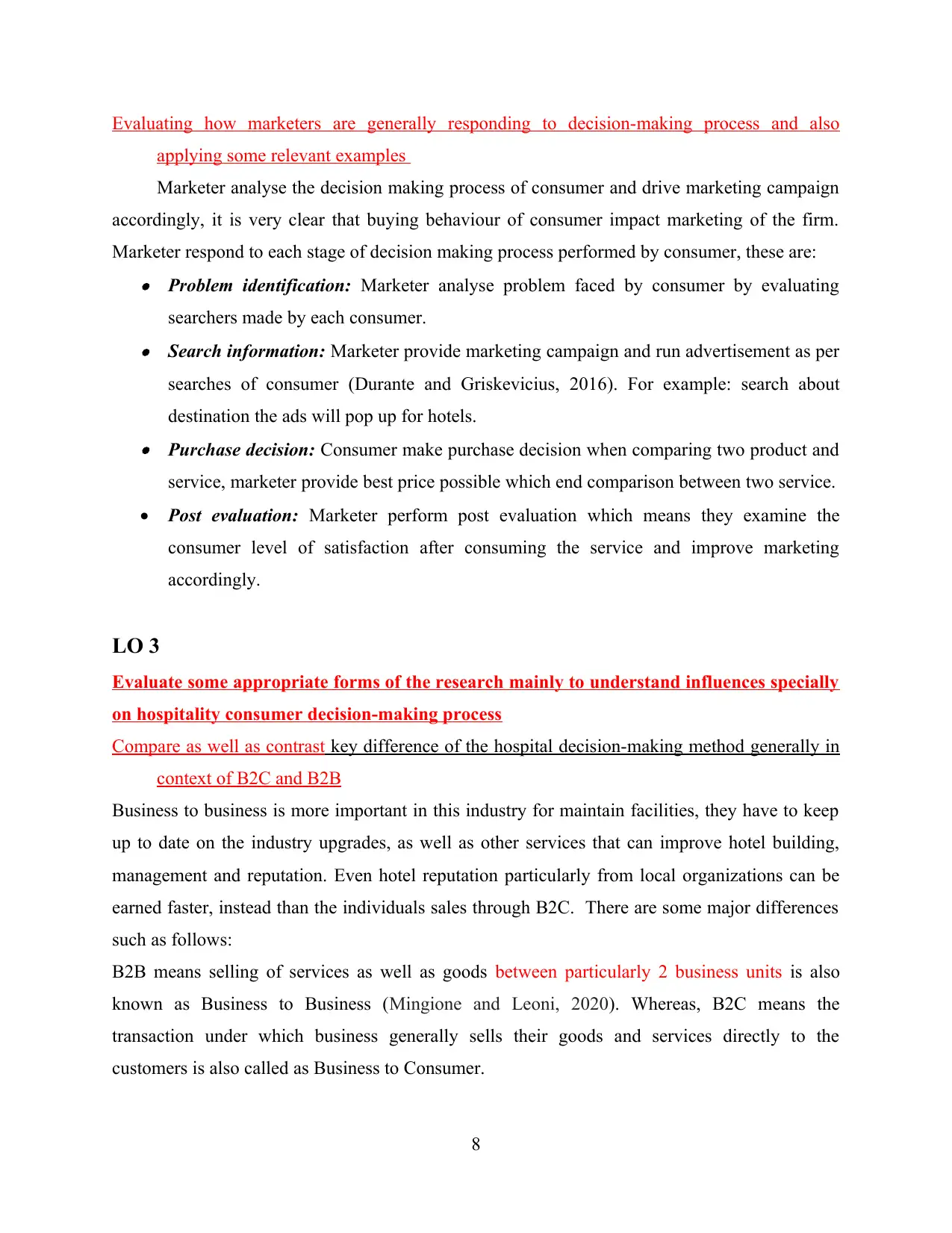
Evaluating how marketers are generally responding to decision-making process and also
applying some relevant examples
Marketer analyse the decision making process of consumer and drive marketing campaign
accordingly, it is very clear that buying behaviour of consumer impact marketing of the firm.
Marketer respond to each stage of decision making process performed by consumer, these are: Problem identification: Marketer analyse problem faced by consumer by evaluating
searchers made by each consumer. Search information: Marketer provide marketing campaign and run advertisement as per
searches of consumer (Durante and Griskevicius, 2016). For example: search about
destination the ads will pop up for hotels. Purchase decision: Consumer make purchase decision when comparing two product and
service, marketer provide best price possible which end comparison between two service.
Post evaluation: Marketer perform post evaluation which means they examine the
consumer level of satisfaction after consuming the service and improve marketing
accordingly.
LO 3
Evaluate some appropriate forms of the research mainly to understand influences specially
on hospitality consumer decision-making process
Compare as well as contrast key difference of the hospital decision-making method generally in
context of B2C and B2B
Business to business is more important in this industry for maintain facilities, they have to keep
up to date on the industry upgrades, as well as other services that can improve hotel building,
management and reputation. Even hotel reputation particularly from local organizations can be
earned faster, instead than the individuals sales through B2C. There are some major differences
such as follows:
B2B means selling of services as well as goods between particularly 2 business units is also
known as Business to Business (Mingione and Leoni, 2020). Whereas, B2C means the
transaction under which business generally sells their goods and services directly to the
customers is also called as Business to Consumer.
8
applying some relevant examples
Marketer analyse the decision making process of consumer and drive marketing campaign
accordingly, it is very clear that buying behaviour of consumer impact marketing of the firm.
Marketer respond to each stage of decision making process performed by consumer, these are: Problem identification: Marketer analyse problem faced by consumer by evaluating
searchers made by each consumer. Search information: Marketer provide marketing campaign and run advertisement as per
searches of consumer (Durante and Griskevicius, 2016). For example: search about
destination the ads will pop up for hotels. Purchase decision: Consumer make purchase decision when comparing two product and
service, marketer provide best price possible which end comparison between two service.
Post evaluation: Marketer perform post evaluation which means they examine the
consumer level of satisfaction after consuming the service and improve marketing
accordingly.
LO 3
Evaluate some appropriate forms of the research mainly to understand influences specially
on hospitality consumer decision-making process
Compare as well as contrast key difference of the hospital decision-making method generally in
context of B2C and B2B
Business to business is more important in this industry for maintain facilities, they have to keep
up to date on the industry upgrades, as well as other services that can improve hotel building,
management and reputation. Even hotel reputation particularly from local organizations can be
earned faster, instead than the individuals sales through B2C. There are some major differences
such as follows:
B2B means selling of services as well as goods between particularly 2 business units is also
known as Business to Business (Mingione and Leoni, 2020). Whereas, B2C means the
transaction under which business generally sells their goods and services directly to the
customers is also called as Business to Consumer.
8
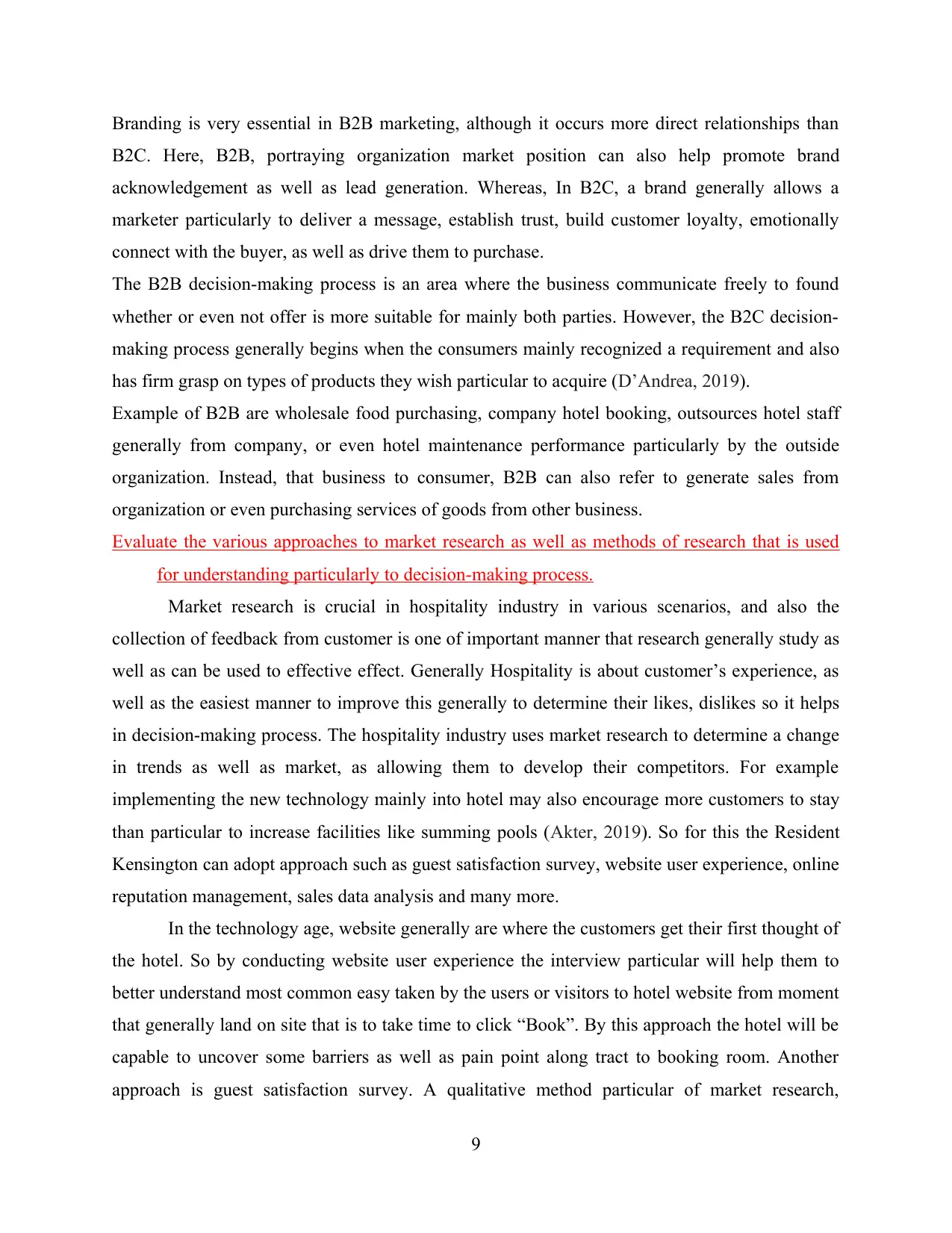
Branding is very essential in B2B marketing, although it occurs more direct relationships than
B2C. Here, B2B, portraying organization market position can also help promote brand
acknowledgement as well as lead generation. Whereas, In B2C, a brand generally allows a
marketer particularly to deliver a message, establish trust, build customer loyalty, emotionally
connect with the buyer, as well as drive them to purchase.
The B2B decision-making process is an area where the business communicate freely to found
whether or even not offer is more suitable for mainly both parties. However, the B2C decision-
making process generally begins when the consumers mainly recognized a requirement and also
has firm grasp on types of products they wish particular to acquire (D’Andrea, 2019).
Example of B2B are wholesale food purchasing, company hotel booking, outsources hotel staff
generally from company, or even hotel maintenance performance particularly by the outside
organization. Instead, that business to consumer, B2B can also refer to generate sales from
organization or even purchasing services of goods from other business.
Evaluate the various approaches to market research as well as methods of research that is used
for understanding particularly to decision-making process.
Market research is crucial in hospitality industry in various scenarios, and also the
collection of feedback from customer is one of important manner that research generally study as
well as can be used to effective effect. Generally Hospitality is about customer’s experience, as
well as the easiest manner to improve this generally to determine their likes, dislikes so it helps
in decision-making process. The hospitality industry uses market research to determine a change
in trends as well as market, as allowing them to develop their competitors. For example
implementing the new technology mainly into hotel may also encourage more customers to stay
than particular to increase facilities like summing pools (Akter, 2019). So for this the Resident
Kensington can adopt approach such as guest satisfaction survey, website user experience, online
reputation management, sales data analysis and many more.
In the technology age, website generally are where the customers get their first thought of
the hotel. So by conducting website user experience the interview particular will help them to
better understand most common easy taken by the users or visitors to hotel website from moment
that generally land on site that is to take time to click “Book”. By this approach the hotel will be
capable to uncover some barriers as well as pain point along tract to booking room. Another
approach is guest satisfaction survey. A qualitative method particular of market research,
9
B2C. Here, B2B, portraying organization market position can also help promote brand
acknowledgement as well as lead generation. Whereas, In B2C, a brand generally allows a
marketer particularly to deliver a message, establish trust, build customer loyalty, emotionally
connect with the buyer, as well as drive them to purchase.
The B2B decision-making process is an area where the business communicate freely to found
whether or even not offer is more suitable for mainly both parties. However, the B2C decision-
making process generally begins when the consumers mainly recognized a requirement and also
has firm grasp on types of products they wish particular to acquire (D’Andrea, 2019).
Example of B2B are wholesale food purchasing, company hotel booking, outsources hotel staff
generally from company, or even hotel maintenance performance particularly by the outside
organization. Instead, that business to consumer, B2B can also refer to generate sales from
organization or even purchasing services of goods from other business.
Evaluate the various approaches to market research as well as methods of research that is used
for understanding particularly to decision-making process.
Market research is crucial in hospitality industry in various scenarios, and also the
collection of feedback from customer is one of important manner that research generally study as
well as can be used to effective effect. Generally Hospitality is about customer’s experience, as
well as the easiest manner to improve this generally to determine their likes, dislikes so it helps
in decision-making process. The hospitality industry uses market research to determine a change
in trends as well as market, as allowing them to develop their competitors. For example
implementing the new technology mainly into hotel may also encourage more customers to stay
than particular to increase facilities like summing pools (Akter, 2019). So for this the Resident
Kensington can adopt approach such as guest satisfaction survey, website user experience, online
reputation management, sales data analysis and many more.
In the technology age, website generally are where the customers get their first thought of
the hotel. So by conducting website user experience the interview particular will help them to
better understand most common easy taken by the users or visitors to hotel website from moment
that generally land on site that is to take time to click “Book”. By this approach the hotel will be
capable to uncover some barriers as well as pain point along tract to booking room. Another
approach is guest satisfaction survey. A qualitative method particular of market research,
9
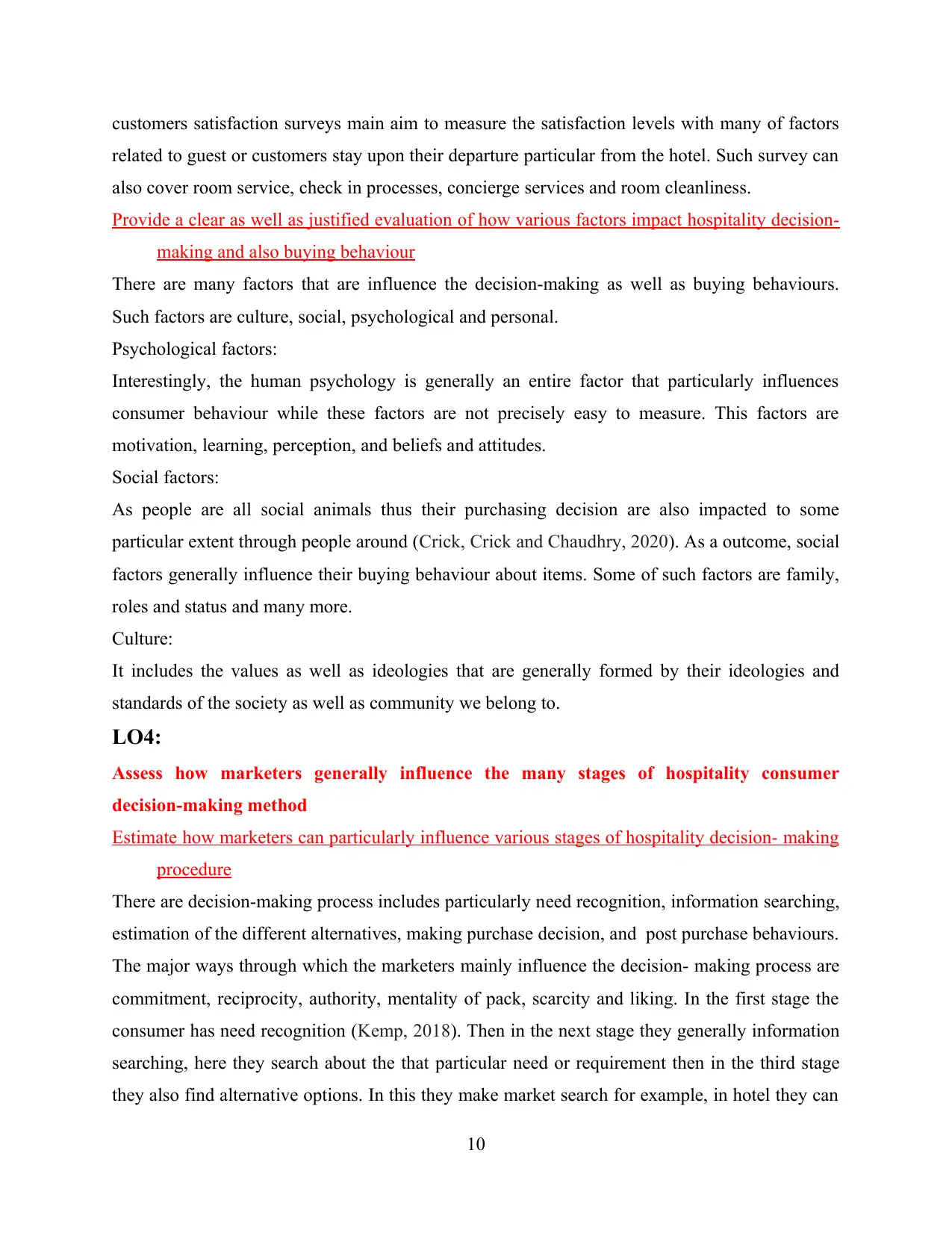
customers satisfaction surveys main aim to measure the satisfaction levels with many of factors
related to guest or customers stay upon their departure particular from the hotel. Such survey can
also cover room service, check in processes, concierge services and room cleanliness.
Provide a clear as well as justified evaluation of how various factors impact hospitality decision-
making and also buying behaviour
There are many factors that are influence the decision-making as well as buying behaviours.
Such factors are culture, social, psychological and personal.
Psychological factors:
Interestingly, the human psychology is generally an entire factor that particularly influences
consumer behaviour while these factors are not precisely easy to measure. This factors are
motivation, learning, perception, and beliefs and attitudes.
Social factors:
As people are all social animals thus their purchasing decision are also impacted to some
particular extent through people around (Crick, Crick and Chaudhry, 2020). As a outcome, social
factors generally influence their buying behaviour about items. Some of such factors are family,
roles and status and many more.
Culture:
It includes the values as well as ideologies that are generally formed by their ideologies and
standards of the society as well as community we belong to.
LO4:
Assess how marketers generally influence the many stages of hospitality consumer
decision-making method
Estimate how marketers can particularly influence various stages of hospitality decision- making
procedure
There are decision-making process includes particularly need recognition, information searching,
estimation of the different alternatives, making purchase decision, and post purchase behaviours.
The major ways through which the marketers mainly influence the decision- making process are
commitment, reciprocity, authority, mentality of pack, scarcity and liking. In the first stage the
consumer has need recognition (Kemp, 2018). Then in the next stage they generally information
searching, here they search about the that particular need or requirement then in the third stage
they also find alternative options. In this they make market search for example, in hotel they can
10
related to guest or customers stay upon their departure particular from the hotel. Such survey can
also cover room service, check in processes, concierge services and room cleanliness.
Provide a clear as well as justified evaluation of how various factors impact hospitality decision-
making and also buying behaviour
There are many factors that are influence the decision-making as well as buying behaviours.
Such factors are culture, social, psychological and personal.
Psychological factors:
Interestingly, the human psychology is generally an entire factor that particularly influences
consumer behaviour while these factors are not precisely easy to measure. This factors are
motivation, learning, perception, and beliefs and attitudes.
Social factors:
As people are all social animals thus their purchasing decision are also impacted to some
particular extent through people around (Crick, Crick and Chaudhry, 2020). As a outcome, social
factors generally influence their buying behaviour about items. Some of such factors are family,
roles and status and many more.
Culture:
It includes the values as well as ideologies that are generally formed by their ideologies and
standards of the society as well as community we belong to.
LO4:
Assess how marketers generally influence the many stages of hospitality consumer
decision-making method
Estimate how marketers can particularly influence various stages of hospitality decision- making
procedure
There are decision-making process includes particularly need recognition, information searching,
estimation of the different alternatives, making purchase decision, and post purchase behaviours.
The major ways through which the marketers mainly influence the decision- making process are
commitment, reciprocity, authority, mentality of pack, scarcity and liking. In the first stage the
consumer has need recognition (Kemp, 2018). Then in the next stage they generally information
searching, here they search about the that particular need or requirement then in the third stage
they also find alternative options. In this they make market search for example, in hotel they can
10
Secure Best Marks with AI Grader
Need help grading? Try our AI Grader for instant feedback on your assignments.
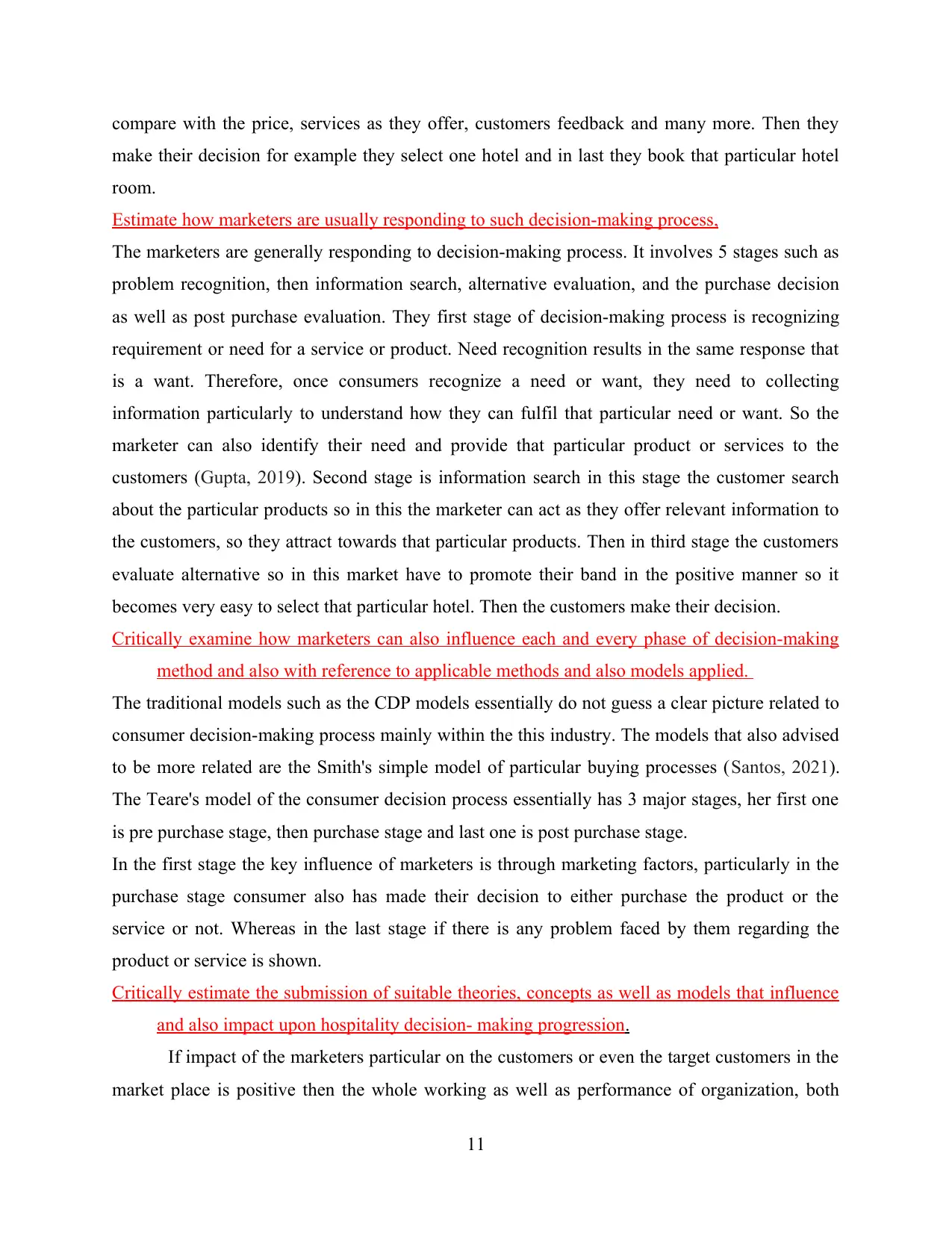
compare with the price, services as they offer, customers feedback and many more. Then they
make their decision for example they select one hotel and in last they book that particular hotel
room.
Estimate how marketers are usually responding to such decision-making process,
The marketers are generally responding to decision-making process. It involves 5 stages such as
problem recognition, then information search, alternative evaluation, and the purchase decision
as well as post purchase evaluation. They first stage of decision-making process is recognizing
requirement or need for a service or product. Need recognition results in the same response that
is a want. Therefore, once consumers recognize a need or want, they need to collecting
information particularly to understand how they can fulfil that particular need or want. So the
marketer can also identify their need and provide that particular product or services to the
customers (Gupta, 2019). Second stage is information search in this stage the customer search
about the particular products so in this the marketer can act as they offer relevant information to
the customers, so they attract towards that particular products. Then in third stage the customers
evaluate alternative so in this market have to promote their band in the positive manner so it
becomes very easy to select that particular hotel. Then the customers make their decision.
Critically examine how marketers can also influence each and every phase of decision-making
method and also with reference to applicable methods and also models applied.
The traditional models such as the CDP models essentially do not guess a clear picture related to
consumer decision-making process mainly within the this industry. The models that also advised
to be more related are the Smith's simple model of particular buying processes (Santos, 2021).
The Teare's model of the consumer decision process essentially has 3 major stages, her first one
is pre purchase stage, then purchase stage and last one is post purchase stage.
In the first stage the key influence of marketers is through marketing factors, particularly in the
purchase stage consumer also has made their decision to either purchase the product or the
service or not. Whereas in the last stage if there is any problem faced by them regarding the
product or service is shown.
Critically estimate the submission of suitable theories, concepts as well as models that influence
and also impact upon hospitality decision- making progression.
If impact of the marketers particular on the customers or even the target customers in the
market place is positive then the whole working as well as performance of organization, both
11
make their decision for example they select one hotel and in last they book that particular hotel
room.
Estimate how marketers are usually responding to such decision-making process,
The marketers are generally responding to decision-making process. It involves 5 stages such as
problem recognition, then information search, alternative evaluation, and the purchase decision
as well as post purchase evaluation. They first stage of decision-making process is recognizing
requirement or need for a service or product. Need recognition results in the same response that
is a want. Therefore, once consumers recognize a need or want, they need to collecting
information particularly to understand how they can fulfil that particular need or want. So the
marketer can also identify their need and provide that particular product or services to the
customers (Gupta, 2019). Second stage is information search in this stage the customer search
about the particular products so in this the marketer can act as they offer relevant information to
the customers, so they attract towards that particular products. Then in third stage the customers
evaluate alternative so in this market have to promote their band in the positive manner so it
becomes very easy to select that particular hotel. Then the customers make their decision.
Critically examine how marketers can also influence each and every phase of decision-making
method and also with reference to applicable methods and also models applied.
The traditional models such as the CDP models essentially do not guess a clear picture related to
consumer decision-making process mainly within the this industry. The models that also advised
to be more related are the Smith's simple model of particular buying processes (Santos, 2021).
The Teare's model of the consumer decision process essentially has 3 major stages, her first one
is pre purchase stage, then purchase stage and last one is post purchase stage.
In the first stage the key influence of marketers is through marketing factors, particularly in the
purchase stage consumer also has made their decision to either purchase the product or the
service or not. Whereas in the last stage if there is any problem faced by them regarding the
product or service is shown.
Critically estimate the submission of suitable theories, concepts as well as models that influence
and also impact upon hospitality decision- making progression.
If impact of the marketers particular on the customers or even the target customers in the
market place is positive then the whole working as well as performance of organization, both
11
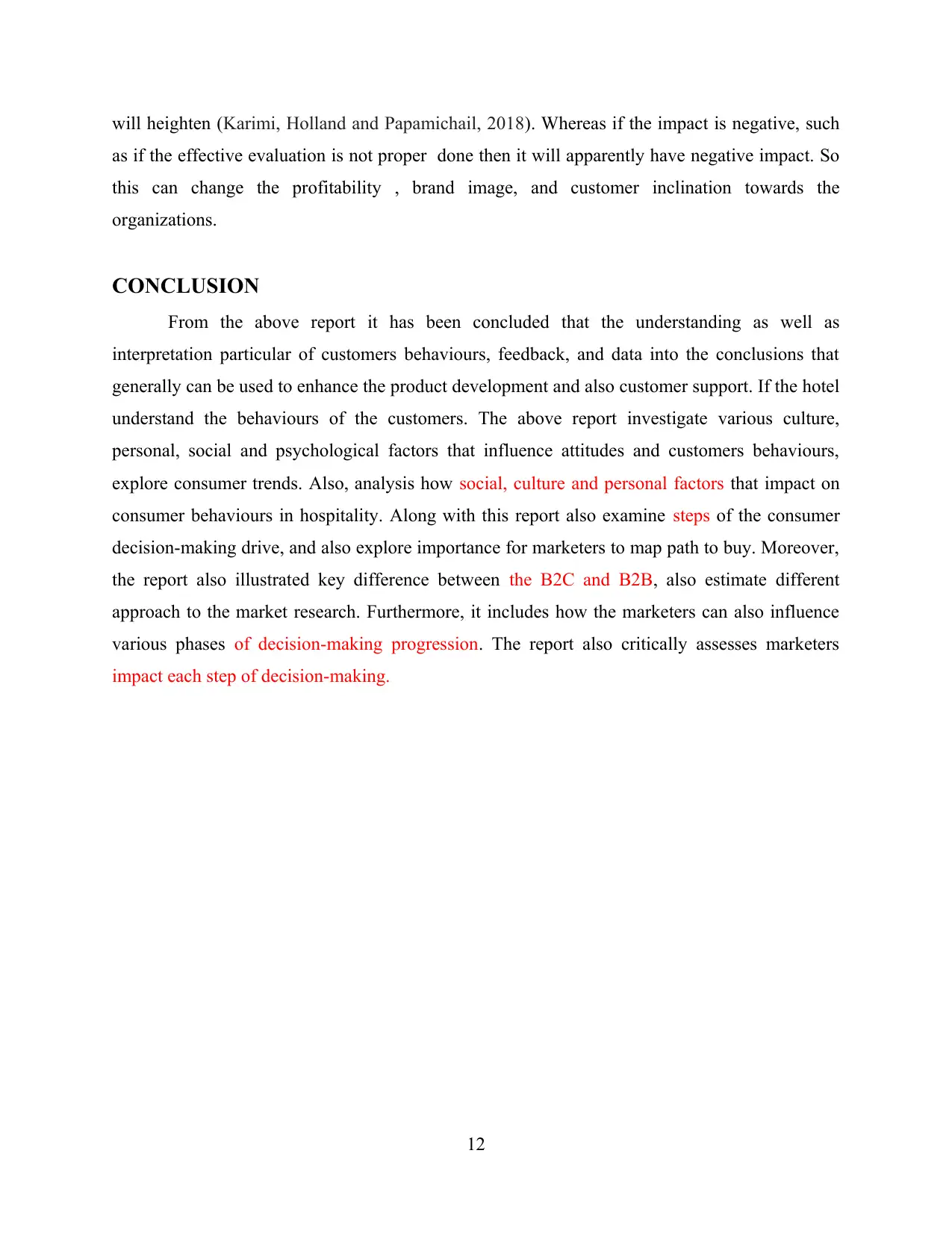
will heighten (Karimi, Holland and Papamichail, 2018). Whereas if the impact is negative, such
as if the effective evaluation is not proper done then it will apparently have negative impact. So
this can change the profitability , brand image, and customer inclination towards the
organizations.
CONCLUSION
From the above report it has been concluded that the understanding as well as
interpretation particular of customers behaviours, feedback, and data into the conclusions that
generally can be used to enhance the product development and also customer support. If the hotel
understand the behaviours of the customers. The above report investigate various culture,
personal, social and psychological factors that influence attitudes and customers behaviours,
explore consumer trends. Also, analysis how social, culture and personal factors that impact on
consumer behaviours in hospitality. Along with this report also examine steps of the consumer
decision-making drive, and also explore importance for marketers to map path to buy. Moreover,
the report also illustrated key difference between the B2C and B2B, also estimate different
approach to the market research. Furthermore, it includes how the marketers can also influence
various phases of decision-making progression. The report also critically assesses marketers
impact each step of decision-making.
12
as if the effective evaluation is not proper done then it will apparently have negative impact. So
this can change the profitability , brand image, and customer inclination towards the
organizations.
CONCLUSION
From the above report it has been concluded that the understanding as well as
interpretation particular of customers behaviours, feedback, and data into the conclusions that
generally can be used to enhance the product development and also customer support. If the hotel
understand the behaviours of the customers. The above report investigate various culture,
personal, social and psychological factors that influence attitudes and customers behaviours,
explore consumer trends. Also, analysis how social, culture and personal factors that impact on
consumer behaviours in hospitality. Along with this report also examine steps of the consumer
decision-making drive, and also explore importance for marketers to map path to buy. Moreover,
the report also illustrated key difference between the B2C and B2B, also estimate different
approach to the market research. Furthermore, it includes how the marketers can also influence
various phases of decision-making progression. The report also critically assesses marketers
impact each step of decision-making.
12
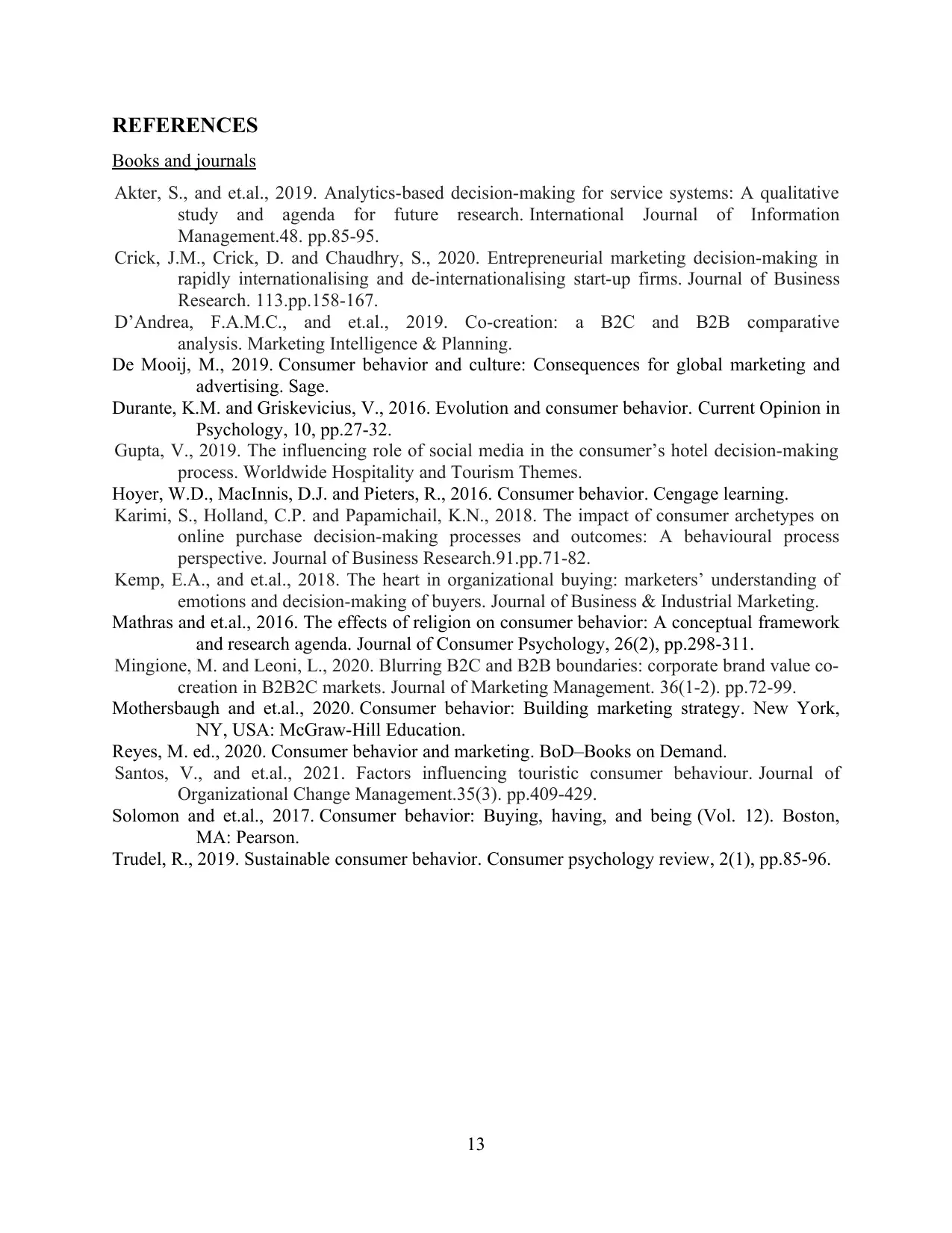
REFERENCES
Books and journals
Akter, S., and et.al., 2019. Analytics-based decision-making for service systems: A qualitative
study and agenda for future research. International Journal of Information
Management.48. pp.85-95.
Crick, J.M., Crick, D. and Chaudhry, S., 2020. Entrepreneurial marketing decision-making in
rapidly internationalising and de-internationalising start-up firms. Journal of Business
Research. 113.pp.158-167.
D’Andrea, F.A.M.C., and et.al., 2019. Co-creation: a B2C and B2B comparative
analysis. Marketing Intelligence & Planning.
De Mooij, M., 2019. Consumer behavior and culture: Consequences for global marketing and
advertising. Sage.
Durante, K.M. and Griskevicius, V., 2016. Evolution and consumer behavior. Current Opinion in
Psychology, 10, pp.27-32.
Gupta, V., 2019. The influencing role of social media in the consumer’s hotel decision-making
process. Worldwide Hospitality and Tourism Themes.
Hoyer, W.D., MacInnis, D.J. and Pieters, R., 2016. Consumer behavior. Cengage learning.
Karimi, S., Holland, C.P. and Papamichail, K.N., 2018. The impact of consumer archetypes on
online purchase decision-making processes and outcomes: A behavioural process
perspective. Journal of Business Research.91.pp.71-82.
Kemp, E.A., and et.al., 2018. The heart in organizational buying: marketers’ understanding of
emotions and decision-making of buyers. Journal of Business & Industrial Marketing.
Mathras and et.al., 2016. The effects of religion on consumer behavior: A conceptual framework
and research agenda. Journal of Consumer Psychology, 26(2), pp.298-311.
Mingione, M. and Leoni, L., 2020. Blurring B2C and B2B boundaries: corporate brand value co-
creation in B2B2C markets. Journal of Marketing Management. 36(1-2). pp.72-99.
Mothersbaugh and et.al., 2020. Consumer behavior: Building marketing strategy. New York,
NY, USA: McGraw-Hill Education.
Reyes, M. ed., 2020. Consumer behavior and marketing. BoD–Books on Demand.
Santos, V., and et.al., 2021. Factors influencing touristic consumer behaviour. Journal of
Organizational Change Management.35(3). pp.409-429.
Solomon and et.al., 2017. Consumer behavior: Buying, having, and being (Vol. 12). Boston,
MA: Pearson.
Trudel, R., 2019. Sustainable consumer behavior. Consumer psychology review, 2(1), pp.85-96.
13
Books and journals
Akter, S., and et.al., 2019. Analytics-based decision-making for service systems: A qualitative
study and agenda for future research. International Journal of Information
Management.48. pp.85-95.
Crick, J.M., Crick, D. and Chaudhry, S., 2020. Entrepreneurial marketing decision-making in
rapidly internationalising and de-internationalising start-up firms. Journal of Business
Research. 113.pp.158-167.
D’Andrea, F.A.M.C., and et.al., 2019. Co-creation: a B2C and B2B comparative
analysis. Marketing Intelligence & Planning.
De Mooij, M., 2019. Consumer behavior and culture: Consequences for global marketing and
advertising. Sage.
Durante, K.M. and Griskevicius, V., 2016. Evolution and consumer behavior. Current Opinion in
Psychology, 10, pp.27-32.
Gupta, V., 2019. The influencing role of social media in the consumer’s hotel decision-making
process. Worldwide Hospitality and Tourism Themes.
Hoyer, W.D., MacInnis, D.J. and Pieters, R., 2016. Consumer behavior. Cengage learning.
Karimi, S., Holland, C.P. and Papamichail, K.N., 2018. The impact of consumer archetypes on
online purchase decision-making processes and outcomes: A behavioural process
perspective. Journal of Business Research.91.pp.71-82.
Kemp, E.A., and et.al., 2018. The heart in organizational buying: marketers’ understanding of
emotions and decision-making of buyers. Journal of Business & Industrial Marketing.
Mathras and et.al., 2016. The effects of religion on consumer behavior: A conceptual framework
and research agenda. Journal of Consumer Psychology, 26(2), pp.298-311.
Mingione, M. and Leoni, L., 2020. Blurring B2C and B2B boundaries: corporate brand value co-
creation in B2B2C markets. Journal of Marketing Management. 36(1-2). pp.72-99.
Mothersbaugh and et.al., 2020. Consumer behavior: Building marketing strategy. New York,
NY, USA: McGraw-Hill Education.
Reyes, M. ed., 2020. Consumer behavior and marketing. BoD–Books on Demand.
Santos, V., and et.al., 2021. Factors influencing touristic consumer behaviour. Journal of
Organizational Change Management.35(3). pp.409-429.
Solomon and et.al., 2017. Consumer behavior: Buying, having, and being (Vol. 12). Boston,
MA: Pearson.
Trudel, R., 2019. Sustainable consumer behavior. Consumer psychology review, 2(1), pp.85-96.
13
Paraphrase This Document
Need a fresh take? Get an instant paraphrase of this document with our AI Paraphraser

14
1 out of 14
Related Documents
Your All-in-One AI-Powered Toolkit for Academic Success.
+13062052269
info@desklib.com
Available 24*7 on WhatsApp / Email
![[object Object]](/_next/static/media/star-bottom.7253800d.svg)
Unlock your academic potential
© 2024 | Zucol Services PVT LTD | All rights reserved.

